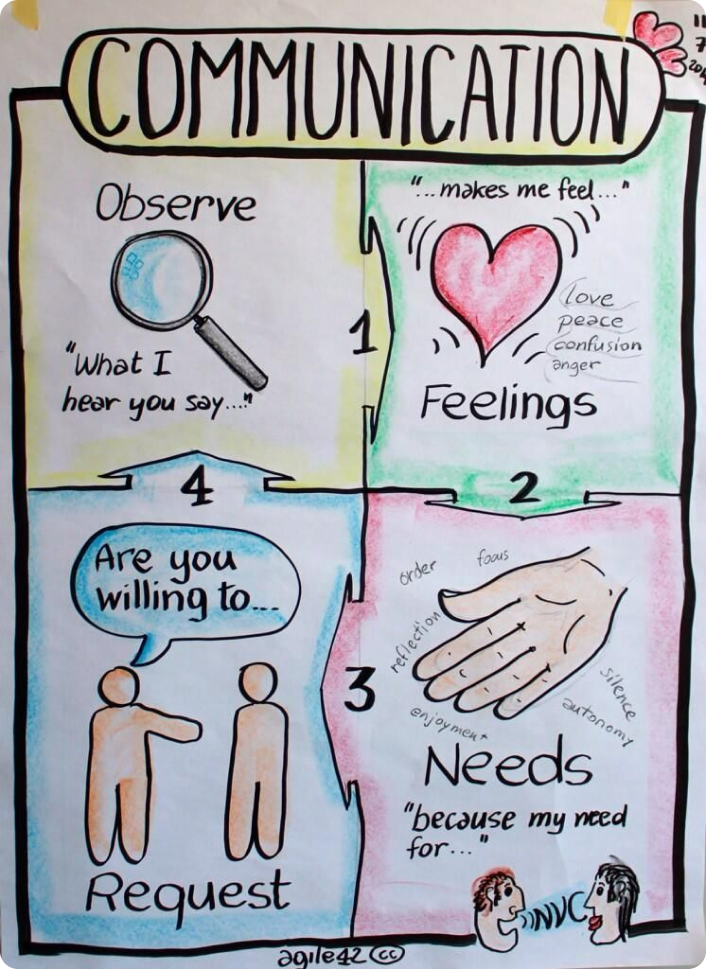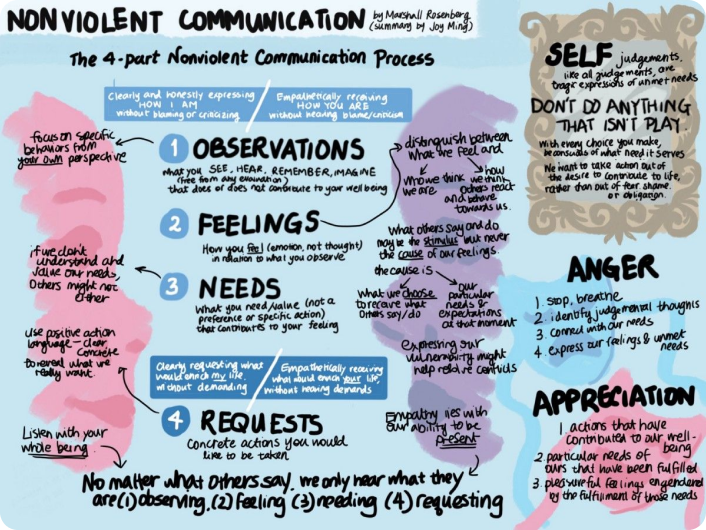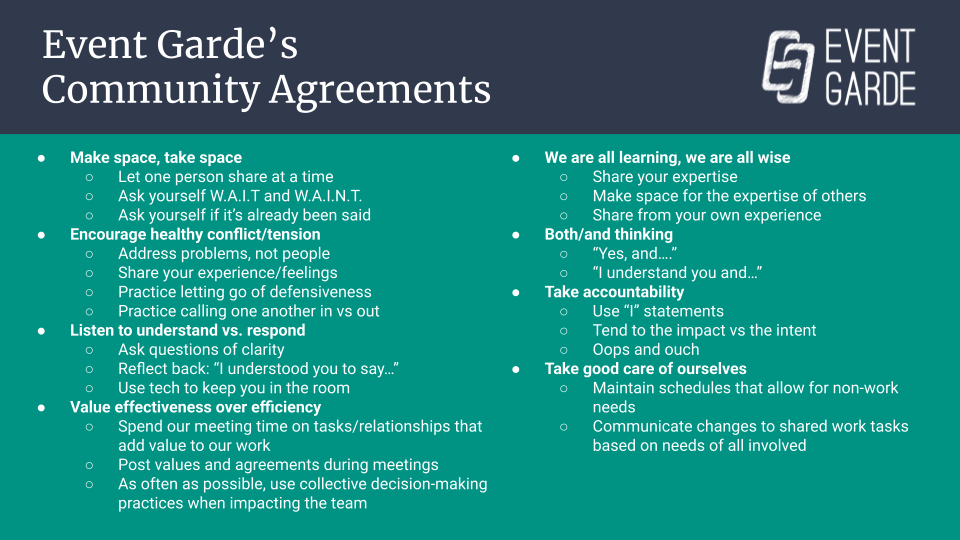Models We Value
Communication is an important part of the work we do. Where possible, the Event Garde team is proactive in establishing expectations around communication that lead to open and honest discussions, and result in mutually beneficial outcomes. Following are just some of the communication models we've adopted, and which align with our core values.
Event Garde Conflict Resolution Model
Conflict is a healthy part of personal and professional relationships, particularly as people work closely together on multiple projects over time. Conflict often arises as a result of breakdowns in communication, expectations (both spoken and unspoken), and trust. While many might prefer avoiding conflict altogether, it only manages to “pop-up” in unexpected ways at later times. Left unaddressed, it can have a negative and lasting impact on both relationships and outcomes. Event Garde strives to address conflict in productive and transparent ways following these steps:
Step 1
The involved parties (e.g., team member to team member or team member to client) will respectfully name the conflict using facts/observations and request an opportunity to meet/discuss by phone or video, as appropriate.
Step 2
The involved parties will carry out the four-part nonviolent communication process by Marshall B. Rosenberg, PhD as outlined below. This may be done with or without the assistance of a volunteer facilitator (either internal or external to Event Garde, as appropriate).
Step 3
If resolution has not been achieved in a reasonable timeframe (i.e., the timeline established among the parties during the final step of the four-part nonviolent communication process) to the satisfaction of either party, the involved parties may engage the Event Garde Founder & President for further intervention.


Event Garde Feedback Model
Feedback, which is often used as a basis for improvement, can seem like a frightening endeavor, particularly when it happens only once a year as part of an annual performance review. This is compounded by the fact that seemingly arbitrary written and unwritten rules often guide the process. For example, when “no one is allowed to get the highest rating,” but compensation and advancement opportunities are directly tied to review outcomes, it’s no wonder that feedback can set the team on edge.
But an annual review process also means that valuable feedback which could be used on an ongoing basis to make micro changes to knowledge, confidence and performance over time is withheld, inhibiting both short- and long-term growth and development. And in the worst-case scenarios, can actually be counterproductive by surprising and demoralizing team members.
The Event Garde team values feedback not once a year, but each and every day. It’s a conscious choice to create and sustain a culture of feedback. We see feedback as not something to be feared, but as a gift of another person’s time, consideration and genuine interest in our long-term success. To that end, following is an overview of the Feedback Model we employ with our team, partners and clients.
Scenarios
Following are just some of the scenarios in which to consider utilizing this Feedback Model:
- Following a client discovery call.
- Following the facilitation of a staff meeting.
- Following each module of a three-part training series.
- Following each day of a multi-day conference we’re managing.
- Following each module of a four-part strategic planning facilitation.
- Following a major client milestone.
- At the conclusion of a client engagement.
Questions
Sufficient time should be planned (anywhere from 10 to 60 minutes depending on the number of people involved) as close to the conclusion of the meeting/event as possible. Following are the questions that should be processed one team member at a time:
TO THE TEAM MEMBER: What was one thing you were mindful of as you were (e.g., leading, training, consulting, facilitating, producing, managing)?
TO THE GROUP: What is a gift you observed demonstrated by the team member that you appreciated? [Tell them directly vs. speaking about them in the third person.]
TO THE TEAM MEMBER: What is one thing you will do differently the next time?
TO THE TEAM MEMBER: Are you open to constructive feedback? [If yes, provide observations without judgment, blame or shame.]
Next Steps
Although having the conversation following a meeting/event is a significant element of this Feedback Model, follow through is required to successfully close the feedback loop. To do so, consider taking the following actions:
- Record the area(s) where you excelled and would like to replicate more often.
- Record the area(s) you’d like to improve upon moving forward.
- Prior to your next meeting/event, set at least one intention you’d like to focus on.
- During that meeting/event, intentionally bring focus to that area(s). Balancing your other responsibilities while focusing on this intention (and course correcting in the moment, as necessary) may be difficult, but your ability to effectively do so will improve over time.
- Following that meeting/event, reflect on your intention to determine your level of success, as well as its impact on you and other key stakeholders.
- Begin again and continue the cycle moving forward.
Event Garde Current Events Model
The Event Garde team is aware that current events happening on a local, state, regional, national and international level can have a different impact on our community of team members, contractors, partners, clients and participants on any given day. We’ve developed a model for processing such events as a way to actively scan for, acknowledge, discuss, educate ourselves and address current events as they occur.
Our priority is to support the people who are so vital to our work as consultants without adding an unnecessary amount of emotional labor on those directly affected. This model is evolving and we will continue to adjust it as we become aware of opportunities to improve our approach. In the meantime, it signifies a commitment by the Event Garde team to not sit idly by as acts of discrimination, oppression and violence affect people based on such social identities as race, color, sex, gender, class, formal education, religion, physical appearance, age, sexual orientation or ability.
Following is the four-step process Event Garde employs to process current events:
Step 1
As individual Event Garde team members become aware of current events that may impact our community, they should share the information in the #currentevents Slack channel.
Step 2
Event Garde will make available to those team members who are interested and available an informal town hall discussion to explore the identified current event(s). During that conversation, immediate next steps will be identified, including but not limited to a need for support, additional information or education.
Step 3
Utilizing a focused conversation, Event Garde will then determine what, if any, outreach is needed to partners, clients and participants of upcoming trainings, facilitations or other contracted engagements.
Step 4
Finally, Event Garde will determine what, if any, public statement should be drafted and released (e.g., light touch vs. heavier touch), the appropriate outlet (e.g., social media vs. email campaign) and any further commitment to action (e.g., volunteer opportunities or monetary donations).
Event Garde Community Agreements Model
Community agreements are a set of expectations for all members of a community to abide by. They can be based on many things, such as how to support each community member and how to make everyone feel included. Effective community agreements serve various purposes, including a tool/practice intended for meaningful dialogue, trust building, consensus building, equitable engagement, conflict management, and shared accountability and decision-making. However, they are not meant to shut people down, establish logistics, set ground rules, avoid conflict, or be punitive or performative.
Process
Once community agreements have been named, whether pre-populated by the facilitator or co-created in partnership with participants, we would typically:
- Clarify: Model calling-in (i.e., how we will hold one another accountable) and address questions of clarity.
- Edit: Invite group input for additions or changes.
- Consent: Gain consensus through visible indicators (such as a thumbs up).
- Post: Establish a public location (digital and/or physical) for easy reference.
- Evaluate: Regularly assess the effectiveness of the agreements.
Resources
You may notice some community agreements (or some iteration of them) that feel familiar because they are shared widely. We borrow and build upon them as an honor to the wisdom used to engage in respectful, meaningful dialogue and knowledge exchange in communities working toward improved conditions and liberation. Resources such as AORTA, Servant Leadership/NVC, and the First Alaskans Institute can provide additional insights.
Anti-Oppressive Processes
Community agreements support anti-oppressive facilitation practices in many ways, including but not limited to the following:
- Inclusive Language: Use language that is inclusive and respectful of diverse identities and experiences. Ensure that agreements reflect a commitment to recognizing and valuing all perspectives, backgrounds, and identities.
- Power Sharing: Foster a culture of shared power and decision-making. Avoid hierarchies that can perpetuate oppressive structures. Encourage collaboration and equitable participation from community members and facilitators alike.
- Relational Accountability: Establish mechanisms for accountability that address harmful behaviors from participants and facilitators. This includes clear processes for addressing harm, restorative justice practices, and consequences for oppressive actions that prioritize connection/relationship.
- Feedback Loops: Establish regular feedback loops where participants can express concerns and provide input on the effectiveness of the community agreements. This helps in continuously refining and adapting the agreements to meet the group’s needs.
Practices to Avoid
When utilizing community agreements, the following practices can cause harm and should be avoided:
- Top-Down Decision-Making: When facilitators or sponsors create community agreements for a group without opportunity for input or co-creation, top-down decision-making is reinforced.
- Selective Enforcement: This can reinforce existing power dynamics and allow certain individuals or groups to act with impunity while others are held to a stricter standard.
- Suppressing Dissent: Rigid enforcement without allowing for constructive dissent or disagreement can stifle diversity of thought and hinder the growth of the community. As facilitators, we must also be “disruptable.”
- Lack of Flexibility: Overly rigid community agreements that lack flexibility may not account for evolving circumstances or changes within the community.
- Not Modeling “Calling In”: Participants and facilitators must be able to ”call in” oppressive behavior; however, if you don’t role model what this looks like, people are likely to object, shut down, or miss the point altogether when a behavior actually necessitates “calling in.”
Event Garde’s Community Agreements
Based upon the intended outcomes of this model, the Event Garde team has developed the following community agreements and associated behaviors for use with our team, partners, and clients:

Event Garde Team Decision-Making Model for Policy & Procedure Development
At Event Garde, decision-making—especially when it results in new or revised policies and procedures—is grounded in our values of diversity, equity, inclusion, and belonging. We believe the best decisions are made collectively, transparently, and iteratively, with meaningful opportunities for input from those most affected.
This model outlines a process for initiating, developing, reviewing, and adopting new policies and procedures, with an emphasis on inclusive team collaboration and shared accountability.
Phase 1: Identifying the Need
Any team member may identify a need for a new policy, procedure, or update - whether prompted by a specific situation, emerging issue, or proactive reflection on how we can improve. The person who initiates the idea becomes the point of contact (POC) for the process.
Questions we may ask at this stage:
- What's prompting the need for a policy or procedure?
- Who is most impacted by this issue?
- What DEIB considerations are important to keep in mind?
Phase 2: Consult Existing Guidance
The POC reviews the Event Garde Team Guidelines and other relevant resources to determine whether guidance already exists.
- If relevant guidance exists, move to Phase 3A.
- If guidance is missing or insufficient, move to Phase 3B.
Phase 3A: Review Existing Guidance Through a DEIB Lens
When updating an existing policy, the POC:
- Assesses how well the current language, structure, and implementation reflect our DEIB commitments.
- Considers how the policy might impact team members across different identities, roles, or lived experiences.
- Gathers examples of how the existing policy has worked - or not worked - in practice.
Phase 3B: Draft New Policy or Procedure Using a DEIB Lens
When creating something new, the POC:
- Begins drafting with input or examples from trusted, inclusive sources.
- Centers accessibility, equity, and psychological safety.
- Engages with one or more colleagues - especially those impacted or holding a relevant perspective - for early input.
In both cases, the draft should include:
- Clear purpose and scope
- Language that is inclusive, plain, and precise
- Opportunities for discretion and flexibility, where appropriate
- Consideration of implementation and accountability
Phase 4: Director Team Review
The draft is shared with the director team for review, comment, and collaborative editing. The purpose is to ensure strategic alignment, surface any concerns, and assess feasibility and potential unintended impacts.
All comments are reviewed and integrated, with particular attention paid to:
- Alignment with DEIB values and team models
- Respect for team autonomy and diversity of working styles
- Potential barriers to equitable implementation
Phase 5: Full Team Review
Once the director team agrees the draft is ready, it is shared with the full team for review and feedback.
Team members are invited to:
- Ask clarifying questions
- Offer improvements
- Name any concerns, especially from their own perspectives or roles
Feedback may be gathered asynchronously (e.g., via Dropbox Paper or Slack), synchronously (e.g., team retreat), or both.
Phase 6: Adoption & Iteration
After the review window, the POC makes final edits and confirms adoption with the director team. The new or updated policy/procedure is then added to the Team Guidelines and shared widely. We recognize that decisions are rarely final. All policies and procedures are considered living documents - open to ongoing reflection and future updates.
A policy may be revisited when:
- Someone raises a concern about its clarity or impact
- There is a change in our context or team composition
- We receive feedback that prompts re-evaluation

